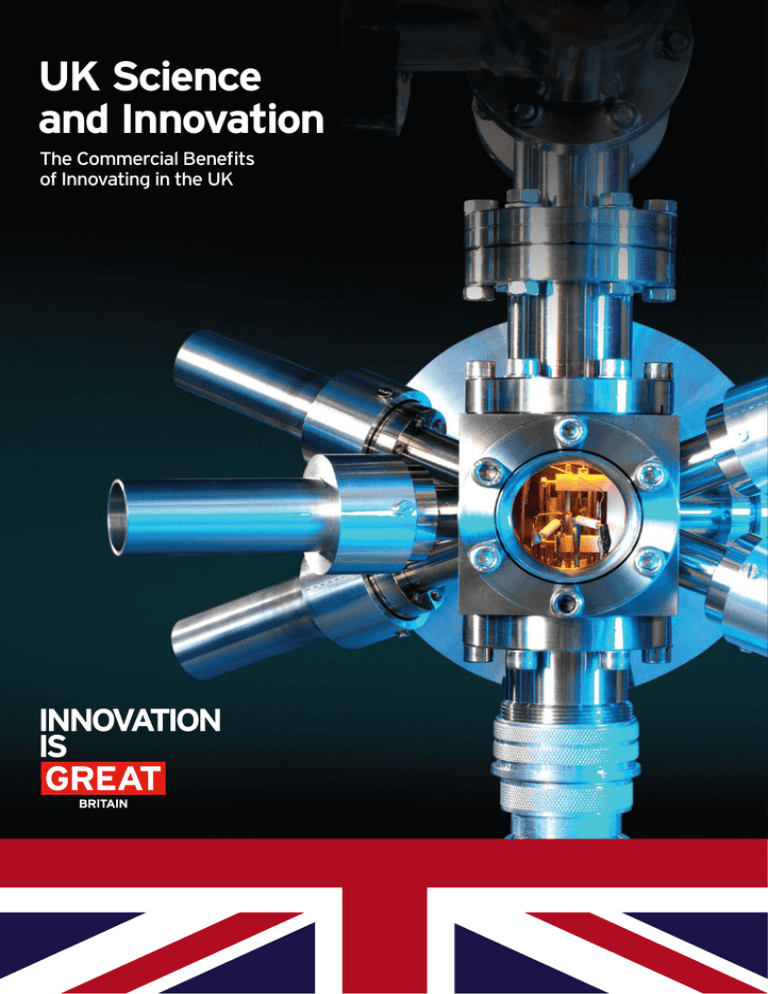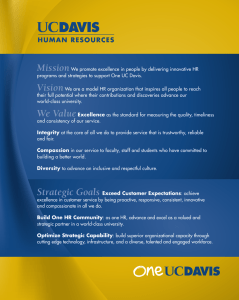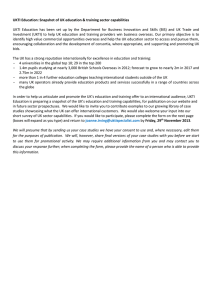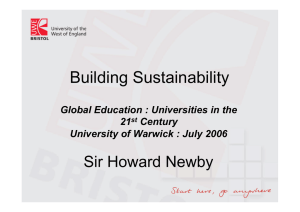UK Science and Innovation
advertisement

UK Science and Innovation The Commercial Benefits of Innovating in the UK UK Science and Innovation Front cover: The first accurate atomic clock was engineered in the UK at the National Physical Laboratory, an organisation that works with over 2,400 companies to deliver more than £630 million of financial benefits each year through measurement innovation. Welcome The UK is proud to be at the forefront of the global race in science and innovation. We know that staying in pole position will take extra dedication and continued commitment. This hunger to lead the pack is driving us to harness our world-leading scientific heritage and push forward the development of new technologies. But a system is only as powerful as the fuel that feeds it. We have identified a group of key technologies for targeted funding to boost their productivity and accelerate global growth – some established success stories, and some future industries. These form part of the Government’s Industrial Strategy. They include: As this brochure demonstrates, our comprehensive and efficient science and innovation system provides a range of attractive investment and R&D opportunities for hi-tech companies from around the world. Coupled with our open business environment, we believe this is crucial for the UK to continue leading the charge for growth in the EU and beyond. • Digital, and particularly Big Data, technologies: will impact on the future of almost every sector and where the UK has considerable strengths, thanks to our leading role in Big Data projects such as the search for the Higgs boson at CERN. Sustained investments by the Government in the UK innovation system have ensured we remain at the forefront of international development capability: • The UK boasts the most productive research base in Europe – our top ranked universities and forward-thinking Research Councils conduct high-quality science that feeds the innovation pipeline. We are also the top destination for inward investment in R&D in Europe. • The Technology Strategy Board, the UK’s innovation agency, supports companies through initiatives such as the ‘Catapult’ centres, to develop new products in a range of key sectors where the UK has advanced capability. • The UK has a world-leading community of wider innovation support bodies – including Government departments, science parks, internationally-respected measurement, standards and IP bodies, as well as private sector specialists who can take your idea and turn it into a marketable reality. • Space and Satellite technologies: already an important and resilient commercial market for the UK – growing by 9 percent year-on-year throughout the recession. • Life-sciences and biosciences: a key strength for the UK – we are developing worldleading capacity in new technologies such as synthetic biology and regenerative medicine. Collaboration across borders increases the quality of research and opens up new markets for innovative companies. The UK is a uniquely favourable market for science and innovation collaboration – as recent high-profile investments from global corporations such as Huawei and Siemens show. With centres of science and innovation excellence across the country, the UK is an accessible and open melting pot of cross-discipline capability. I hope that as you read this brochure you will discover more about the strengths of our science and innovation system, and come to understand that we have all the components for your company’s success. If you need further support, UK Trade and Investment are well placed to guide you through the UK’s innovation system and uniquely favourable investment environment. Please do contact them. David Cameron Prime Minister February 2014 UK Science and Innovation 1 “ Those of you who have not invested in the UK should consider doing so. Contents Haruo Naito President, Eisai A World-Class Commercial Proposition… 3 …the UK has the Components for Innovation Success 4 UK Innovation Opportunities 6 The UK’s World-Class Science and Innovation Landscape… 8 …Transforming Ideas into Commercial Reality 10 Government Support for Innovation: Helping International Companies to Access UK Science and Innovation Expertise 12 Sector-specific fact sheets 13 The UK was the leading G20 country in the ‘2013 Global Innovation Index’. # Source: World Intellectual Property Organization, 2013 1 20 % of the UK workforce is employed in science-based occupations within research and related industries. Source: The Science Council, 2013 80 The ultimate accolade: the UK has had over 80 Nobel Prizes in scientific disciplines. Source: Nobel Foundation, 2013 Tel: +44 (0) 207 215 5000 Email: enquiries@ukti-invest.com www.ukti.gov.uk/scienceinnovation 2 2 UK Science UK Science and Innovation and Innovation 8.8bn £ Foreign-owned companies invested £8.8 billion in R&D in the UK in 2011, up by 33 percent year-on-year. Source: ONS, 2013 A £92 million partnership between the University of Warwick, Jaguar Land Rover and Tata Motors European Technical Centre is creating a new National Automotive Innovation Campus in Coventry. The partners forecast a ten-fold return on investment through improved products, processes and services. Half of the world’s commercial aircraft fly on wings made in Britain, and every 2.5 seconds a Rolls-Royce powered aircraft takes off or lands somewhere in the world. Choose the UK for world-leading aerospace expertise. UK Science and Innovation A World-Class Commercial Proposition… By investing billions of pounds each year in the UK’s science and innovation ecosystem, the world’s leading companies secure both a strong return on investment and a commercial advantage in their respective sectors. 1 For companies such as Ford, Pfizer, Airbus, Huawei, Eli Lilly, Nokia and Eisai, the UK’s welcoming business environment is the natural choice for large-scale investment in innovation – indeed, according to the latest official data, 50 percent of all UK-based business expenditure on research and development activities was undertaken by foreign-owned companies. A robust system of protecting intellectual property The commercial benefits of the UK’s science, innovation and engineering infrastructure for international businesses and entrepreneurs include: Access to a world-class academic and research environment 2 3 Globally-recognised measurement and standards systems that support innovation 4 A competitive package of tax and incentives support for innovation 5 A strong supply of highly-skilled employees 6 A proven business and investment environment 3 4 UK Science and Innovation …the UK has the Components for Innovation Success 1. A world-class academic and research environment International companies are heavily involved in undertaking collaborative innovation projects in the UK, benefiting from the expertise and leading‑edge technologies available in the academic and research environment. Indeed, the UK has the highest proportion of overseas-funded research and development in the OECD. The UK has globally-renowned research universities – such as Oxford, Cambridge and Imperial College London – underpinned by a wide range of public and private research institutes across numerous business sectors. UK universities are at the forefront of working in partnership with similar establishments throughout Europe on collaborative innovation projects, enabling UK-based companies to access and benefit from the full range of European university expertise. 4. A competitive package of tax and incentives support for innovation The UK’s business-friendly tax environment is a significant benefit to international companies with the main rate of corporation tax falling to 20 percent by 2015 – one of the most competitive rates in the world. Businesses undertaking innovation activities are able to benefit even further from additional reductions in corporation tax through the ‘Patent Box’ initiative (which reduces corporation tax on profits from patents to 10 percent) and from recent enhancements to the UK’s generous research and development tax credit scheme. And, in certain locations, companies have the opportunity of locating in an Enterprise Zone which can provide even more enhanced tax incentives. In addition to the highly-competitive tax package, the UK also provides a wide range of government-funded grants that support all stages of the innovation process, from initial concepts through to commercialisation. UK Science and Innovation 298 International companies made 298 investments in UK-based R&D in 2012/13, the highest ever annual total. Source: UKTI, 2013 2. A robust system of protecting intellectual property 3. Globally-recognised measurement and standards systems that underpin innovation International companies seeking to commercialise their innovation activities benefit significantly from the UK’s world-class intellectual property system that provides strong protection for new ideas, concepts and developments. The UK has a globally-renowned track record for scientific measurement. The National Physical Laboratory (NPL), for example, is a world-leading centre of excellence in developing and applying the most accurate measurement standards, science and technology available – indeed, each year NPL works directly with over 2,400 companies to deliver more than £630 million of financial benefits through measurement innovation. This expertise underpins the ‘SI’ system and supports innovation in various disciplinary technologies. The UK complies with all of the main international agreements on intellectual property rights and works closely with the World Intellectual Property Organization, the European Union and the World Trade Organization. The key organisation responsible for overseeing intellectual property rights in the UK (including patents, trade marks, designs and copyright) is the UK Intellectual Property Office (www.ipo.gov.uk). In addition, UK-based BSI is one of the largest providers of standards in the world and is at the forefront of shaping new industry standards globally in areas such as management systems, governance, anti-bribery and financial services. The UK also has a well-established infrastructure for testing and certification, underpinned by the internationally-recognised United Kingdom Accreditation Service. Overseas entities own 41.5 percent of patents in the UK, compared to 12.6 percent in the US, 2.4 percent in Japan and 17.4 percent in Germany 5. A strong supply of skilled employees The UK has the highest number of graduates annually in Western Europe The UK’s business-friendly labour market, combined with the skill, commitment and flexibility of the workforce, are recognised as proven commercial assets by the thousands of international companies that have already invested here. 618,694 Source: OECD, 2014 From innovative entrepreneurial startup firms through to established global companies, international businesses recognise the clear commercial value that a UK presence adds to their operations. 44,853 Ita ly Sp Ne ai n th er la nd s Ire la nd 137,746 284,461 385,510 411,482 466,645 The UK is one of the world’s leading business locations and attracts more international investment than any other country in Europe. U Ge K rm an y Fr an ce Companies undertaking UK-based innovation activities know that they have on-going access to a strong supply of specialist scientific skills. Indeed, the UK produces the highest number of graduates annually in Western Europe from its 170 universities and higher education institutes. Source: OECD, 2014 6. A proven business and investment environment For companies seeking funds for innovation, the UK has the strongest venture capital market in Europe Source: BVCA, 2013 5 6 UK Science and Innovation UK Innovation Opportunities From robotics to life sciences, and from advanced manufacturing to the creative industries, the UK’s world-renowned science and innovation environment is a core commercial asset for international companies in the development of market-leading products and services. Eight Great Technologies Big data Satellites The UK has one of the largest ICT markets in Europe with particular strengths in the adoption of new technologies, innovation, design and the many opportunities emerging across society from ‘big data’. The UK Government’s ‘Space Innovation and Growth Strategy’ has the target of growing the UK space sector to £40 billion per annum by 2030. Synthetic biology Advanced materials At the forefront of global developments in autonomous systems and robotics, the UK benefits from world-class skills in software programming and data handling. The UK is well-placed to take advantage of future research opportunities in synthetic biology that will benefit a wide range of industrial sectors including chemicals, materials, biosensors, biofuels and healthcare. From developing new high-performance composites and nanomaterials, to finding additional uses and production methods for steel and ceramics, UK technology is underpinning global advances in manufacturing and materials. Agri-science Regenerative medicine Energy storage UK innovations in agri-science and technology are meeting the ongoing challenge of improving global production levels. The UK’s strong track record in providing globally-recognised innovation in regenerative medicine and stem cells is enhanced by a world-class clinical trials infrastructure, strong government research funding and a well-established regulatory framework. The UK has internationally-recognised innovation expertise in the key areas of ‘mobile’, ‘small-scale’ and ‘grid-scale’ energy storage technology solutions with applications across multiple sectors including automotive, aerospace, infrastructure, renewables, portable computing, medical, leisure and defence. The following eight technology areas have been prioritised in the UK for concentrated government and commercial support: Robotics and autonomous systems UK-based Nanoco is the world’s leading developer and manufacturer of quantum dots. Surrey Satellite Technologies, one of the UK’s most successful university spin-outs, is the world leader in high‑performance small satellites. Precision farming research utilising geospatial technologies at Harper Adams University. Touch Bionics, the UK-based provider of innovative prosthetic technologies. UK Science and Innovation Innovation-led technologies The UK’s outstanding track record of innovation in key technologies is driving a range of world-class opportunities in areas such as: Energy £110 billion of investment opportunities by 2020 have been identified in innovative low‑carbon electricity generation and transmission in the UK. Creative industries Transport The UK is home to global market leaders in fashion, TV, film, architecture, design, advertising and digital games, all of which benefit from a strong pool of innovative talent and skills. The UK is renowned globally as a centre for technological innovation and commercialisation in aerospace, automotive, marine and rail. Life sciences, healthcare and biosciences Future cities With an outstanding track record in drug discovery and clinical translation, the UK is at the forefront of the global life sciences sector, with world-class specialisms in key areas including regenerative medicine and synthetic biology. The global market for ‘integrated citywide solutions’ is expected to be worth £200 billion a year by 2030 – UK‑based companies are at the leading‑edge of innovative developments in this fast‑growing area. For further information on UK innovation opportunities, please see the detailed fact sheets at the back of this brochure or visit www.ukti.gov.uk/ scienceinnovation Photograph: Jonathan Leijonhufvud The Guangzhou International Finance Centre – designed in the UK by Wilkinson Eyre Architects – uses 20 percent less steel than similar skyscrapers. Nano-robot swarms will be a key component of future healthcare. © Victor Habbick Visions/ Science Photo Library DiRT Showdown, designed and developed at Codemasters, the innovative UK digital games company. 7 8 UK Science and Innovation The UK’s World-Class Science and Innovation Landscape… Research Councils The Research Councils provide the world-class research, first-class infrastructure, high-level skills and knowledge transfer that underpins innovation across the UK. RESEARCH COUNCILS Managing a budget of approximately £3 billion for research that covers the full range of academic disciplines from the medical and biological sciences to physics, chemistry and engineering, and from social sciences through to arts and humanities, the seven Research Councils are: BUSI INNOVA • Biotechnology and Biological Sciences Research Council • Medical Research Council • Science and Technology Facilities Council • Engineering and Physical Sciences Research Council ‘Diamond Light Source’ is the largest UK-funded scientific facility in over 40 years. Producing X-ray, infrared and ultra-violet beams that enable scientists and engineers to probe deeply into the basic structure of matter and materials, the Diamond synchrotron’s technology is being increasingly used in areas such as medicine, geological studies and structural genomics. • Natural Environment Research Council • Arts and Humanities Research Council • Economic and Social Research Council To maintain the UK’s leading research position, the Research Councils offer a diverse range of funding opportunities, foster international collaborations and provide access to the best facilities and infrastructure globally. To maximise the impact of research on economic growth and innovation, the Research Councils work closely with many organisations involved in research and innovation including businesses, charities, the Technology Strategy Board and other government establishments. The UK Research Partnership Investment Fund, managed by HEFCE, is providing £300 million to stimulate £1 billion of investment in R&D collaborations between universities, businesses and charities. www.rcuk.ac.uk Case study: The Biomedical Catalyst The £180 million Biomedical Catalyst, funded by the Medical Research Council and the Technology Strategy Board, offers funding to innovative SMEs and academics seeking to develop the latest solutions to global healthcare challenges in areas that include stratified medicine, regenerative medicine, diagnostics, eHealth, mHealth and medical devices. Three categories of grant are available, specifically ‘Feasibility/Confidence in Concept’ awards, ‘Early Stage’ awards and ‘Late Stage’ awards. © Zephyr/Science Photo Library – X-ray of hip area showing electrical implant for pain relief TECHNOLOGY STRATEGY BOARD UK Science and Innovation 9 The UK’s world-class science and innovation ecosystem comprises a comprehensive range of interlocking resources that, together, provide companies with the strongest science and innovation environment in Europe. This enables companies in the UK to generate leading-edge ideas and use innovative design to commercialise them into becoming tomorrow’s market‑leading products and services. Universities UNIVERSITIES NESS VATION WIDER INNOVATION COMMUNITY International companies can benefit from the UK’s university expertise by accessing leading scientists, next-generation facilities and technologies, and by undertaking collaborative innovation projects. The UK has more than 170 universities and institutes of higher education, including seven of Europe’s top ten universities. UK universities have an exceptional international reputation and are highly experienced in working closely with all parts of the private sector to undertake leadingedge science, innovation and engineering projects. Indeed, the World Economic Forum’s most recent ‘Global Competitiveness Report’ placed the UK second in the world for university-business interaction in R&D (and ahead of the US). In addition, UK universities generate an astonishing 13.8 percent of the world’s most highly-cited scientific papers (second only to the US). The strength of UK universities is further demonstrated by their success at winning funding from the European Union, with collaborative research grants and regeneration programmes increasing by 19 percent year-on-year in 2012 to reach £871 million. www.universitiesuk.ac.uk The UK has seven of the top ten universities in Europe Source: QS University Rankings 2013 University European Global Rank Rank University of Cambridge 1 3 University College London 2 4 Imperial College London 3 5 University of Oxford 4 6 University of Edinburgh 6 17 King’s College London 7= 19= University of Bristol 10 30 Case study: The University of Oxford Isis Innovation Limited, Oxford University’s technology transfer company, pioneered the successful commercial exploitation of academic research and invention. Isis: • has created more than 80 companies • files, on average, more than one patent application each week • manages over 470 patent application families and 700 licence agreements ‘The Cambridge Phenomenon’: The University of Cambridge has been the main catalyst in the development of the world-class cluster of innovative technology and life sciences companies in the Cambridge area. 10 UK Science and Innovation …Transforming Ideas into Commercial Reality Technology Strategy Board The Technology Strategy Board is the UK’s innovation agency and is responsible for a wide range of innovation programmes and mechanisms to support businesses. These include Knowledge Transfer Partnerships, Knowledge Transfer Networks, the Collaborative Research and Development programme, Smart awards and Innovation Vouchers. One of the leading opportunities for international companies is the Catapult Programme. Catapult is the name for a network of new elite technology and innovation centres, designed to transform research rapidly into commercial success. £ ££ The Technology Strategy Board co-funds and supports thousands of business-led innovation projects in the UK. • High Value Manufacturing • Cell Therapy • Offshore Renewable Energy • Satellite Applications • Connected Digital Economy • Future Cities • Transport Systems www.innovateuk.org www.catapult.org.uk BUSI INNOVA TECHNOLOGY STRATEGY BOARD The Catapult centres each focus on a specific area of technology and expertise with great potential, including: The Catapult centres support businesses and scientists to collaborate on late-stage research and development projects and to adopt, develop and exploit innovative products and technologies. They offer concentrated expertise in areas vital for commercialisation, as well as access to state‑of‑the‑art technology and equipment. The Programme represents a long-term investment that will open up global opportunities for the UK and generate economic growth for the future. RESEARCH COUNCILS From the Nobel Prize-winning development of MRI to cutting-edge neuroimaging techniques, choose the UK for medical technology. UK Science and Innovation A £43 million partnership between the University of Sheffield’s Advanced Manufacturing Research Centre (AMRC) and manufacturing companies is developing the AMRC Factory 2050. This will be the world’s most flexible factory, capable of rapidly switching production between different high-value components and one-off parts. Wider innovation community UNIVERSITIES NESS VATION WIDER INNOVATION COMMUNITY The UK Government has a strong tradition of providing support for science and innovation in the UK, with bodies such as the Department of Health, the Ministry of Defence and the Department for Environment, Food & Rural Affairs, spending millions of pounds on innovation each year. Innovative fibre optic fabric with applications in fashion and textile design The renowned national academies – the Royal Society, the Royal Academy of Engineering, the British Academy and the Academy of Medical Sciences – also play a vital role in underpinning the UK research base and contributing to the world-class status of UK research and of those who undertake it. Complementing the work of official bodies are internationally-renowned research and technology organisations in the private, public and charitable sectors including QinetiQ, Motor Industry Research Association, ERA Technology, National Physical Laboratory, the Wellcome Trust Sanger Institute, the John Innes Centre and Roke Manor Research. These organisations provide a range of bespoke innovation services, including contract research, fundamental research, applied research, consultancy, market testing, field testing and evaluation. Businesses operating in the UK benefit from an extensive network of over 100 science parks and 300 business incubators that support companies to develop and commercialise leading-edge technologies. These facilities allow companies to take advantage of enhanced business support services, including privileged links to universities and research centres, access to specialist laboratories and leading‑edge equipment, and dedicated innovation and business support from on-site business advisors. www.ukti.gov.uk/scienceinnovation According to the Association of Independent Research and Technology Organisations, the UK intermediate research and technology sector has a turnover of each year and provides a range of business-to-business and government services such as R&D, consultancy, validation and testing, multi-client project inception and management, incubation and financing. over £4 billion 90 % of the research output from the world-renowned Wellcome Trust Sanger Institute is carried out in collaboration with other organisations. 11 1212 UKUK Science Science and and Innovation Innovation Government Support for Innovation Helping International Companies to Access UK Science and Innovation Expertise UK Trade & Investment is the expert advisory organisation that offers confidential, professional and free services to international companies from all parts of the world that are seeking to access the UK’s world-class science and innovation ecosystem. Our global team consists of experts who specialise in key technologies and industry areas. Each of our experts has first-hand knowledge of the UK’s science and innovation ecosystem – they use this knowledge to provide tailored advice and practical support to international companies at all stages of the innovation and commercialisation process. Our range of services includes: • detailed guidance on accessing the world-renowned innovation expertise and leading-edge technologies available through the UK’s universities, the Technology Strategy Board, Research Councils and other centres of innovation excellence • advice on accessing financial assistance (including R&D tax credits, the Patent Box and innovation grants) • the provision of detailed regional and local location analysis to help you choose the right place to set up in the UK • the provision of tailored information on key commercial considerations such as skills, real estate, transport, utilities and regulatory issues • assisting international entrepreneurs to develop innovative UK business opportunities through our Global Entrepreneur Programme •c ontinued support through our Investor Development network which offers assistance to international companies once they have established a presence in the UK Our advisers are based in the UK and in British diplomatic offices worldwide, giving your business direct access to a well-connected local presence on the ground at home and in the UK. If you require further information about the many opportunities to benefit from the UK’s science and innovation ecosystem, please contact UK Trade & Investment at: Tel: +44 (0) 207 215 5000 Email: enquiries@ukti-invest.com www.ukti.gov.uk/scienceinnovation Every year motorsport companies invest £1 billion in British research and development. For world-leading advanced engineering, choose the UK. UKTI works with the UK’s Science and Innovation Network (SIN). SIN was established by the Department for Business, Innovation and Skills and the Foreign & Commonwealth Office and is based in 28 countries around the world. SIN works to: • s timulate strategic collaborations between UK and international partners •h arness international technology partnerships and investment in research and innovation •u nderstand and feed into science and innovation policies of governments, industry and academia internationally • improve UK policy based on emerging opportunities and challenges – and international experience. For further information please visit: www.gov.uk/global-science-andinnovation-network UKUK Science Science and and Innovation Innovation “ Our feeling is that the environment in the UK is very welcoming. The British Government is very helpful to Huawei as a Chinese inward investor. They gave a lot of support to introduce Huawei to potential business partners and we feel the UK is a very open market. Victor Zhang Chief Executive Officer, Huawei UK 1313 www.ukti.gov.uk UKTI UK Trade & Investment is the Government Department that helps UK‑based companies succeed in the global economy. We also help overseas companies bring their high-quality investment to the UK’s dynamic economy, acknowledged as Europe’s best place from which to succeed in global business. Disclaimer Whereas every effort has been made to ensure that the information in this document is accurate, neither UK Trade & Investment nor its parent departments (the department for Business, Innovation and Skills, and the Foreign and Commonwealth Office) accept liability for any errors, omissions or misleading statements, and no warranty is given or responsibility accepted as to the standing of any individual, firm, company or other organisation mentioned. © Crown copyright 2014 You may re-use this information free of charge in any format or medium, strictly in accordance with the terms of the Open Government Licence. To view this licence, visit: www.nationalarchives.gov.uk/doc/open-government-licence or e-mail: psi@nationalarchives.gsi.gov.uk. Where we have identified any third party copyright information in the material that you wish to use, you will need to obtain permission from the copyright holder(s) concerned. Any enquiries regarding this material should be sent to us at enquiries@ukti.gsi.gov.uk or telephone +44 (0)20 7215 5000. This document is also available on our website at www.ukti.gov.uk Production The paper in this document is made from 50 percent recycled waste pulp with 50 percent pulp from well-managed forests. This is a combination of Totally Chlorine Free and Elemental Chlorine Free. The inks are vegetable oil-based and contain resins from plants/trees, and the laminate on the cover is sustainable, compostable and can be recycled. Published February 2014 by UK Trade & Investment URN 13/1079 To find out more, scan this code with your smartphone www.ukti.gov.uk






